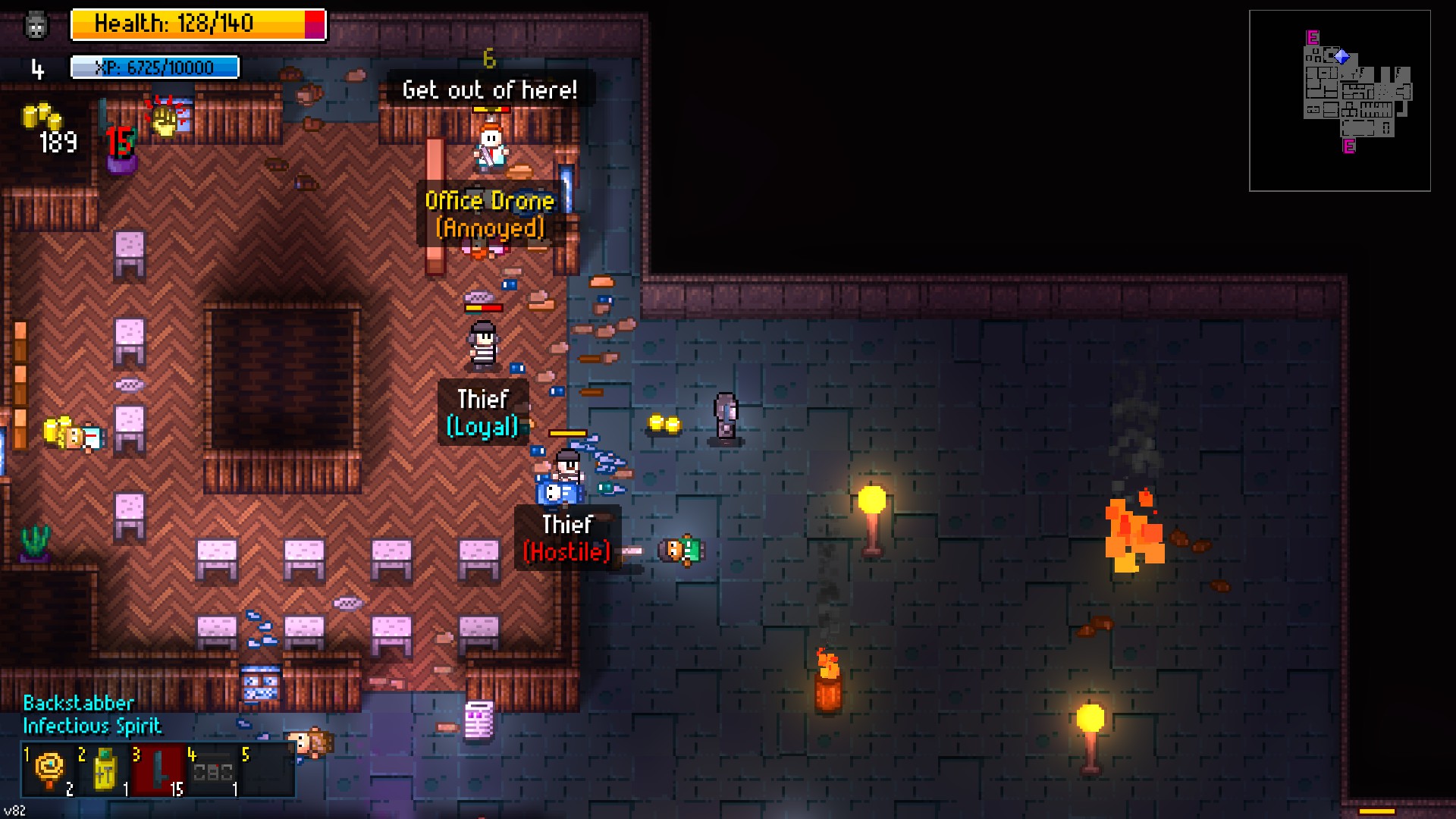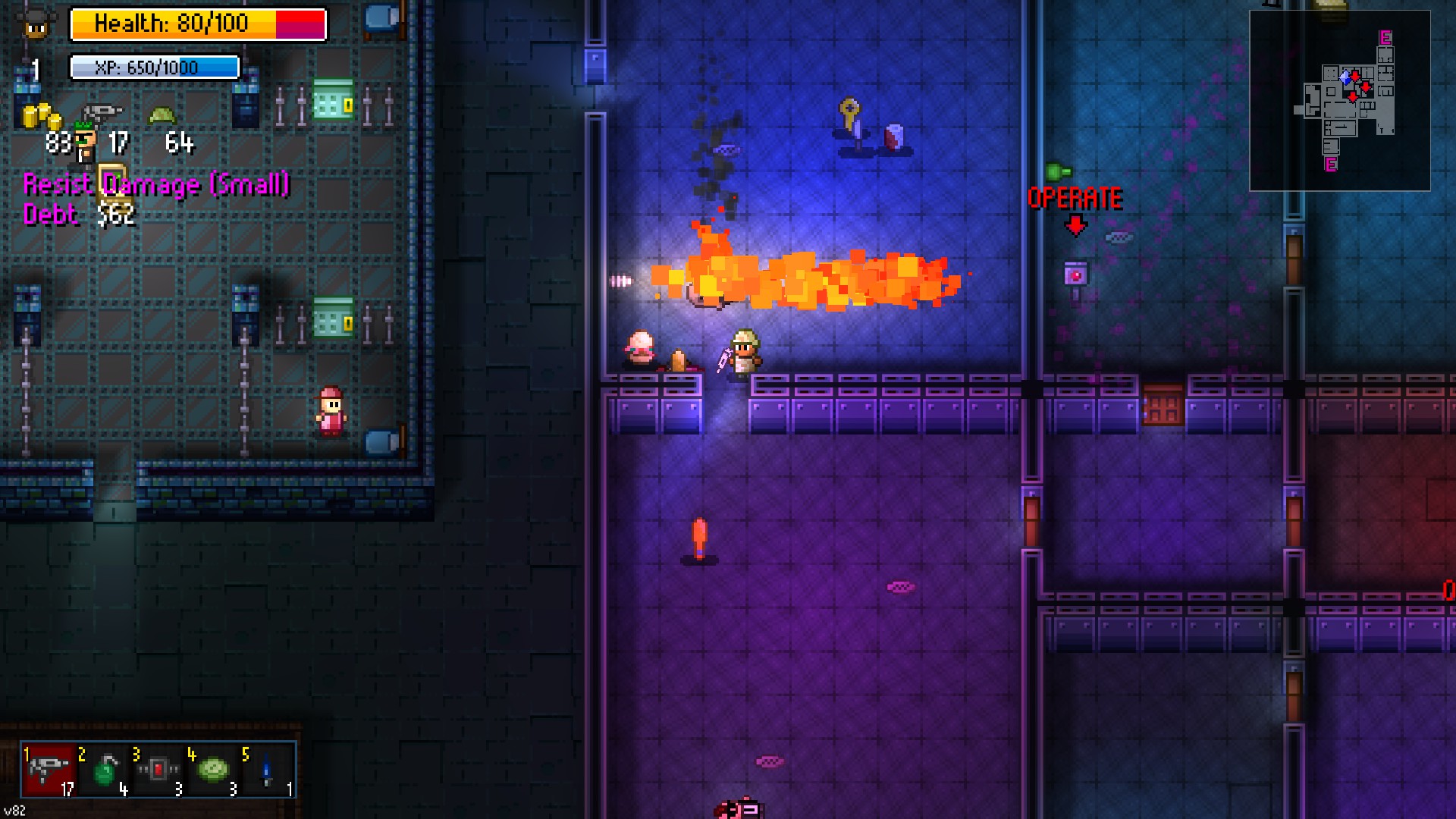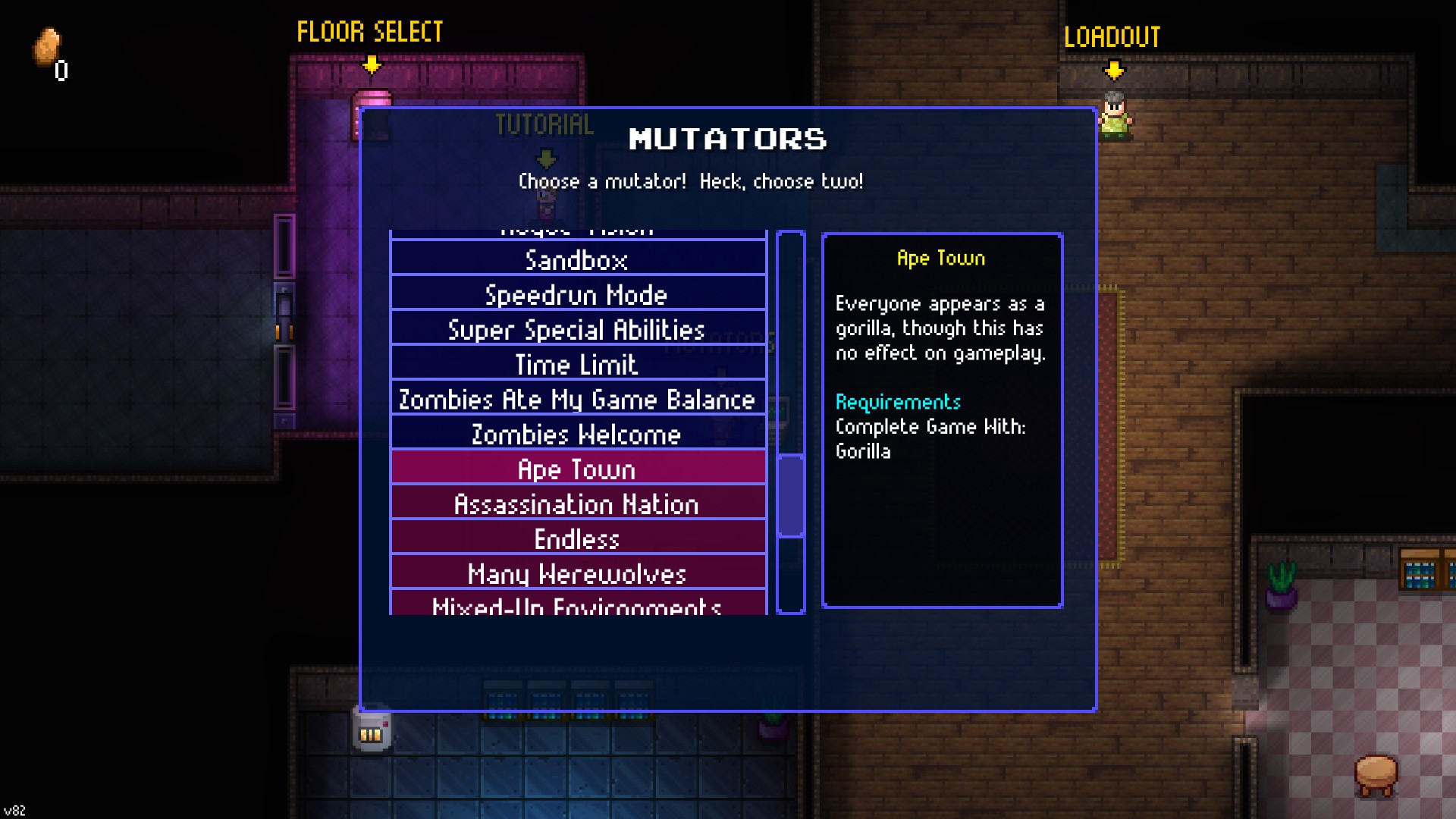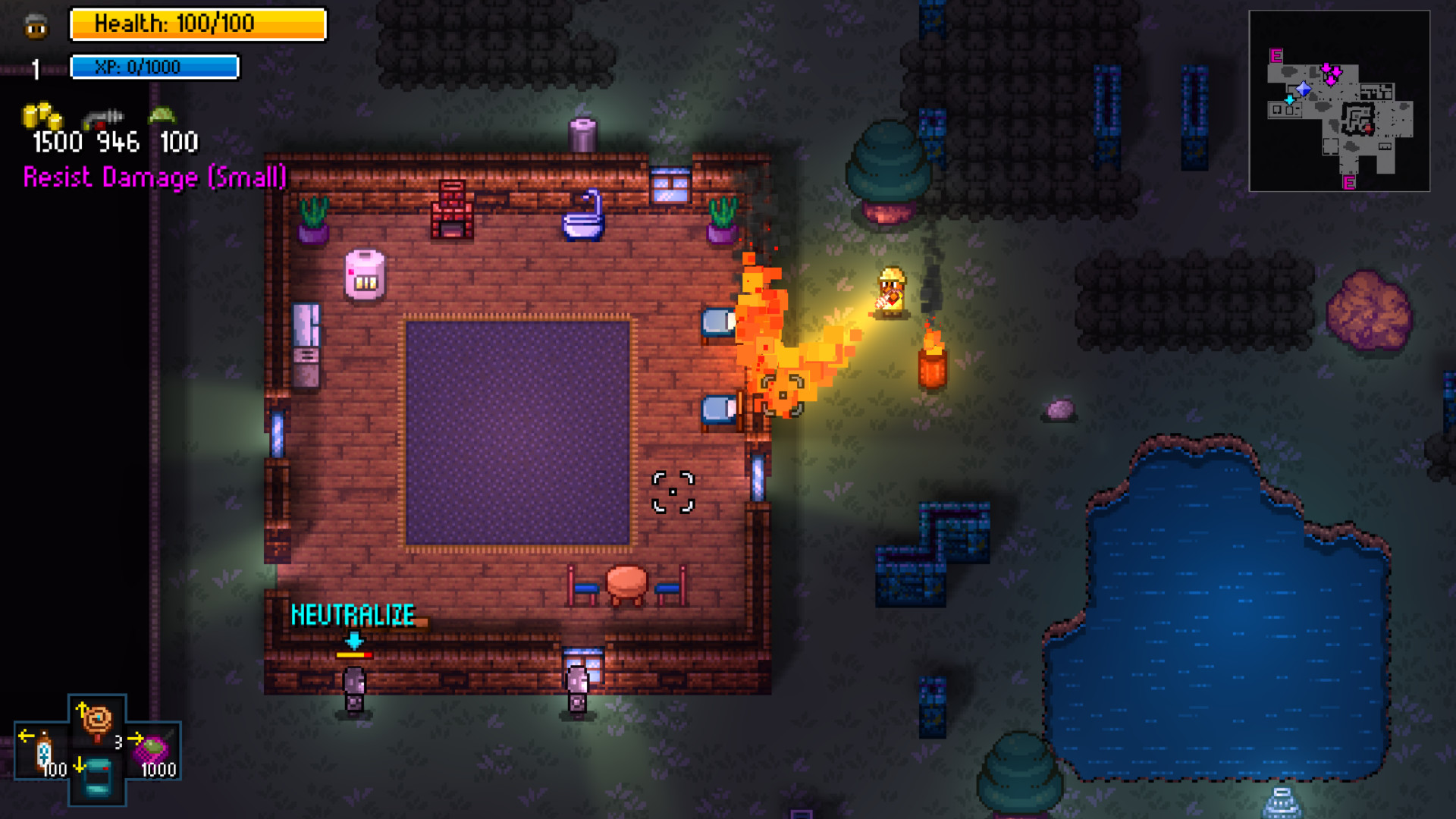Our Verdict
A flexible roguelike with more than enough playstyles to keep you coming back.
PC Gamer's got your back
What is it? A chaotic rogue-like with endless player choice.
Expect to pay: $20 / £15.50
Developer: Matt Dabrowski
Publisher: tinyBuild
Reviewed on: i7-7700HQ, GTX 1050Ti, 8GB RAM
Multiplayer: Up to four-player co-op, both online and local
Link: Official Site
On my first run, I'm an assassin, backstabbing enemies and slinging shuriken. Then I'm a jock, barrelling through walls and swinging a baseball bat. Next, I'm a gorilla, flanked by three other primates, tearing scientists apart with my bare hands in the middle of downtown. Somehow, I avoid the patrolling cops on that last one, probably because I’d injected two of my companions with an invisibility serum—plus, there was a riot in the streets, turning the level into a mosh pit of gang fights, enraged shop owners, and firefighters whacking office workers with axes.
In the brilliant, bananas 2D roguelike Streets of Rogue, you play as one of 26 characters, killing targets and stealing macguffins from guarded buildings. After you finish all your missions you take the elevator to the next procedurally-generated floor, and keep going until you die or reach the end. Missions are formulaic and repeat often, and the world doesn’t feel all that different between stages despite a few new buildings and NPC types, but what makes Streets of Rogue special, and unpredictable, is the unique traits of each character, which constantly create new, surprising interactions with the world.

Cannibals and vampires
Streets of Rogue is designed in the style of an immersive sim, in that each character has multiple ways to approach any given situation. As the hacker, I’m asked to kill a member of the blue gang, the Crepes. He’s surrounded by buddies, and as a scrawny nerd I’m no good with my fists or a pistol. There are no nearby turrets I can program to target him and no computers to blow up in his face, which are two of my usual tricks. Instead, I hire him as a bodyguard for the rest of the level, walk to the other side of town, and dive into a den of red gang Blahds, who gun him down without blinking. Job done.
After a zombie infestation special event cuts that run short, I choose the cannibal, who regenerates health by munching corpses. On the third floor, I have to steal a wallet from a chest in the back room of a bar. But bartenders don’t like cannibals, and if I try to walk in I’ll be bounced out by him and his customers. I could blow a hole in the wall with a grenade, but everyone outside will see. Instead, I pour a vial of a mystery liquid into the air filtration system, which saps their strength. I burst through the door and beat them bloody, gorge on their bodies, and help myself to the wallet, ignoring the wailing camera on the wall.

It’s a build-your-own roguelike, basically, and you can make it as hard or as easy as you like.
As well as randomised missions, each character has their own optional ‘big quest’, and if you complete its task on each of a run’s 15 levels you receive a new permanent ability for that class. They’re often the highlight of a run. The bartender has to make and serve three drinks to different NPCs on each level, and each recipe has its own effect on the drinker, enraging them, poisoning them, or making them super fast. The firefighter’s big quest is to extinguish fires set by arsonists, who only appear if you choose that character.
These quests, and the unique traits of each character, make picking a new class feel like playing a completely different game. With the assassin, who can go invisible and chain stab enemies, I’m playing a slow-burn stealth game. With the soldier and their machinegun, it’s a top-down shooter. Streets of Rogue is not groundbreaking as either, but being able to choose between 26 different playstyles makes it hard to stop playing. I still have a handful of characters to unlock, including a vampire who must kill a hidden werewolf on each level.
And after 15 hours, I’m still finding new ways to use characters I thought I’d mastered. I only just realised, for example, that hackers can hack fridges to make them literally ‘run’ (geddit?), flattening anyone in their path and then bursting open to reveal the food inside, which restores HP. I also just discovered eating burnt bodies restores more HP as the cannibal, so I buy a flamethrower whenever I can.
Mutations
Even if you stick with one character, each run takes on its own personality thanks to the items you find in shops, chests and safes, as well as the traits you pick up between levels. Finishing a floor lets you choose a trait from a list of three, and you can push for a specific playstyle by picking traits that match. I pair a trait that lets me recruit extra followers with one that gives followers more health to start a roving gang that can win almost any fight.
Streets of Rogue also boasts a huge list of custom rules, called mutators, that you can toggle on and off, and you can decide exactly which traits and items appear in the unlock pool. It’s a build-your-own roguelike, basically, and you can make it as hard or as easy as you like. After a series of slower runs I turned on bigger bullets, exploding bodies, and faster move speed. It’s utter chaos.

I’m off to see how exactly how much damage a comedian can do if you give them a rocket launcher, infinite ammo and an inventory full of bacon cheeseburgers.
There are a few things I find bothersome. Commanding your companions is fiddly, but if you don’t micromanage them they’ll run off and get themselves killed. It’s too easy to get into buildings by knocking on the door, waiting for the person to answer and ducking inside as soon as they turn around. As I mentioned, the levels are uninspiring—each three-floor stage has a different skin, but the changes never really affect the action. And the four-player co-op isn’t much fun with strangers because distractions scatter players in different directions.
The inclusion of slavery feels entirely out of place, too. Most levels have slavemasters that you can buy slaves from, and you can unlock the slavemaster as a playable character. In a game with a caricatured world where chicken nuggets are a black market currency, the inclusion of slavery is jarring, especially when the slaves make jokes (“Hey, remember when you literally owned me? Wow, those were the days…”).
Those sticking points aside, Streets of Rogue is absolutely worth playing, and once you start, it’s hard to stop. It gives you more freedom than almost any roguelike, and its varied cast of characters, combined with the randomness of traits and mutators, mean no two runs play out the same way.
Now if you’ll excuse me, I’m off to see how exactly how much damage a comedian can do if you give them a rocket launcher, infinite ammo and an inventory full of bacon cheeseburgers.
A flexible roguelike with more than enough playstyles to keep you coming back.
Samuel Horti is a long-time freelance writer for PC Gamer based in the UK, who loves RPGs and making long lists of games he'll never have time to play.



